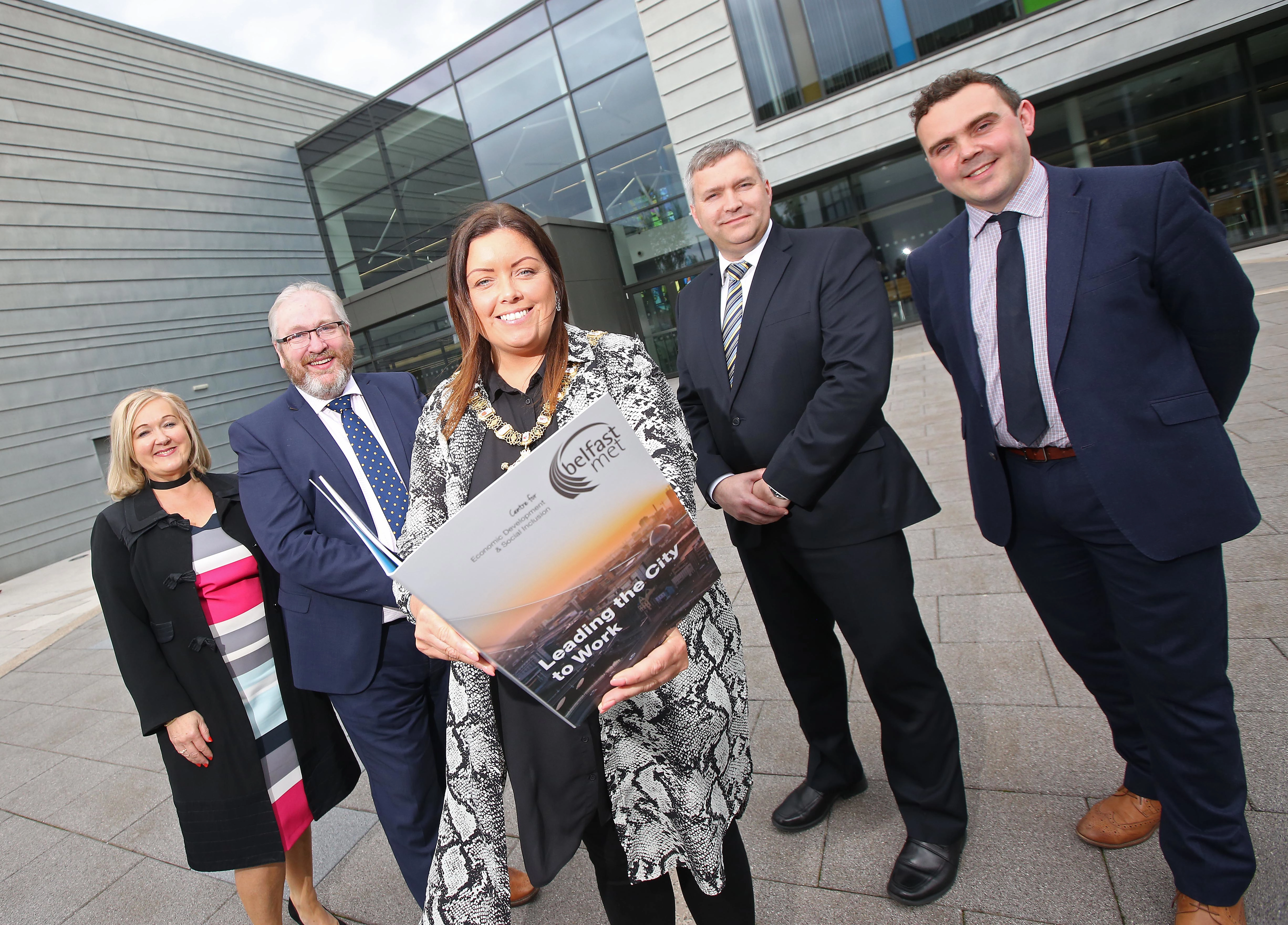News
Belfast Met Launches New Centre for Economic Development and Social Inclusion

Leading the City to Work … Delivering Economic and Social Outcomes
Belfast Met today (18th June) launched its brand new Centre for Economic Development and Social Inclusion at its e3 Springvale Campus.
The event outlined plans for the centre and featured speakers such as Russell Gunson, director of Institute for Public Policy Research in Scotland and the new Belfast Lord Mayor, Deirdre Hargey.
Speaking at the launch, Damian Duffy, the college’s Director of Development, said: “In recent years it has become apparent that the contribution of FE Colleges to the economy of Northern Ireland is not only in terms of skills solutions in the form of academic programmes, training and apprenticeships. Nowhere is this contribution better demonstrated than in Belfast Metropolitan College. The development of the new Centre for Economic Development and Social Inclusion (CEDSI) which is being launched this June, brings together a cross-College capability in supporting business development, graduate pre-employment programmes, community programmes and social enterprise, research and development for business and training solutions for the long-term unemployed and economically inactive and for young people not currently in education, training or employment. Working alongside the Centre for Skills and Apprenticeships in the College, this new Centre adds the finishing touches to a team which has won regional and national awards for external engagement activities.
“The CEDSI team brings together an unrivalled capacity to support a range of programmes which will make a long lasting contribution to economic and social inclusion in Belfast and beyond.”
The College has built on the successes of the Assured Skills Programme working with the Department for Economy to place over 1,000 graduates into employment in the last 3 years. The Community Programmes Team has secured in excess of £5 million in funding from PEACE IV and European Social Fund (ESF) programmes to deliver the FUTURES and Skills for Industry Programmes which will focus on reconnecting with young people and long-term unemployed to create progression pathways into Further Education and Training. The Research Team is working on the GenComm project supporting hydrogen fuel cell research and has secured the first Horizon 2020 project for any FE College in the UK. The capacity within the CEDSI team has been further recognised when Belfast Met was asked to take the lead on the development of the Skills and Employability proposition for the new Belfast Region City Deal working with 6 Councils across Northern Ireland.
Within the FE Sector in Northern Ireland Belfast Met has led the way on various regional initiatives including Curriculum Reform, Marketing, Economy, Training and International Working Groups to ensure that all 6 Colleges are collaborating across the policy areas to ensure the best outcomes for learners and their families. The continued contribution of FE to the economy nationally is assured, but there are nonetheless increased pressures on funding for local Colleges in order to be able to maintain the breadth and depth of their economic and social offer.
In his recent address at the University College London, Institute of Education, Martin Doel, the former Chief Executive of the UK Association of Colleges commented that: “Further Education is a complex eco-system which constantly adapts and changes and provides a distinctive contribution to the economy.” In Belfast Met this eco-system is best demonstrated through the range of programmes the College offers for businesses, learners, trainees and apprentices aimed at delivering skills which create economic opportunities and pathways to allow disadvantaged and excluded groups to improve their employment prospects.”
The range, variety and relevance of the programmes which are delivered in FE Colleges have expanded to meet the needs of the local economy and society. When the education system fails to deliver young people with the qualifications to progress into the world of work, FE steps in to deliver a solution. When employers need responsive programmes to meet their training and apprenticeship needs in line with the growth prospects for the economy, FE provides a comprehensive solution across all the key sectors. Despite the improving labour market prospects in Northern Ireland, large numbers struggle to secure opportunities for economic activity. Once again FE Colleges are stepping in to develop and deliver new Bridge to Employment Programmes, PEACE IV and ESF Projects which will create opportunities for progression onwards through education, training and apprenticeship solutions.
Despite funding pressures Belfast Metropolitan College continues to make choices, working with employers and community partners which remain focused on Leading the City to Work. The understanding and acceptance of the contribution which the College makes to delivering economic opportunities for individuals and employers and the reach which the institution has across the City Region to support social inclusion activities, has given rise to the decision to establish the Centre for Economic Development and Social Inclusion in Belfast Met.
CEDSI will not only support the development and delivery of successful programmes and projects for the Department for Economy and other funders to meet the priorities set out around working and learning in the Programme for Government and the Belfast Agenda, but equally will provide a focal point for applied reflections on shaping the future of FE as a key driver of a vibrant economy, while supporting the active inclusion of those with low or no qualifications, or who have barriers to learning, and providing them with the skills and qualifications they need to find employment, achieve their potential and participate in and contribute to the economic and social life and wellbeing of the city.
Establishment of the Centre ensures that our solutions are located as a key part of all the efforts in the Belfast City Region to create inclusive economic growth and social cohesion. It is a clear statement of the College’s commitment to delivering on our dual mandate to support economic development and social inclusion for the long term success of the City and wider region.
